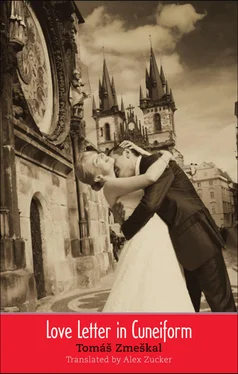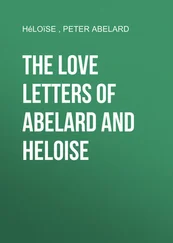She was still the same, yes, almost the same, Hynek noted. She may have put on a little weight since having her child. He gripped her hand the way he had learned to do at meetings when welcoming and parting with his political partners, matter-of-factly, without hesitation. His secretary-cum-clerk knew what to do next, rising, bowing first to him, the commissioner, then to the woman he’d never seen but the commissioner clearly knew, the woman with the deep green eyes. Eyes so green the secretary nearly gasped. Luckily he didn’t have to say anything, so he was able to hide it. He bowed, closed the door behind him, and went off to jot down in his semiofficial diary that today Comrade Commissioner Dr. Hynek Jánský had received a visit from a woman of about twenty-eight. He hurriedly looked up her name in the visitors log at the reception, where the green-eyed brunette in a suspiciously elegant skirt suit had signed in as Květa Černá. In the next column she had put her date of birth and ID number, and the secretary was pleased to see he had guessed her age correctly.
Once they were alone, Hynek could no longer contain himself, lifting Květa’s hand to his mouth, until he was nearly kissing it. In the end, however, he was constrained, almost against his will, by his ruthless self-control, the same quality that made him such a fearsome tennis opponent, his lips stopping precisely 1.45 inches short of her fingers in the lightest intimation of a kiss. He smiled, taking cognizance of the fact that Květa had indeed gained weight since having had her child. As he raised his eyes from her hand, he couldn’t fail to register the undulation of her body, dominated by the peaks of her breasts, the whole package hidden beneath her dress like a landscape blanketed in snow.
He slid one chair away from the table, she sat down, and he pulled around another chair, directly across from hers, so it was at her side. Then he let her tell her story. Her husband was locked up, yes, he was in investigative detention, but the word investigative didn’t mean anything. Uncle Josef Vissarionovich was on the throne in the Kremlin, and the phrase merely meant that Josef was locked up. Nothing more, nothing less. It didn’t actually mean that anyone was investigating anything. It was just a humble, fawning expression of the geometry of power. Nothing more, nothing less. He said he would find out whatever he could about Josef. He didn’t say his boys had already ridden roughshod over him. He said he would try , and he said he didn’t want to get her hopes up. All this he said with a serious, sincere expression, brightened only by momentary flashes of happiness at the fact that he was seeing her again.
Looking back on it, he was glad she had rejected his offer of marriage before the war. He was constantly in meetings anyway, he wouldn’t have had time for a family. The only thing that still irked him a little was the fact that she had turned him down for Josef. She’d waited for him, for Josef, to speak up and ask for her hand, while Hynek had offered to marry her a whole year before. It had been awkward. Yes, awkward. Hynek was honest, he didn’t lie to her. He just … left some things out. Like the fact that his boys had given Josef a nice going-over. Not him! His boys. He also hadn’t made the mistake of contacting her first. He just waited for her to find him on her own. He had always known what was going on with Květa. He’d kept track. But the other way around? For her, the whole thing had ended before the war. For her!
If at least it hadn’t been his best friend, Josef, who never did understand women. Josef, his friend. His best friend, the klutz. If it had been anyone else but Josef, he could have stood the rejection.
As Květa walked away, she was glad Hynek hadn’t taken advantage of the situation to invite her out for a drink or lunch or coffee, so they could reminisce about old times before the war. He appeared to be completely reconciled to the fact that she was the wife of another man. Once upon a time, after all, the three of them had been friends.
After Květa left, after he opened the door for her and she walked out of his office into the hallway and he shut it behind her again, Hynek spread his arms wide and threw himself against the yellowed wooden paneling, trying to embrace it, hold it, and then, quietly, so that no one on the other side could hear, he sank to his knees. Then, no longer entirely in control of himself, he began stroking the chair Květa had been sitting in a moment before, running his fingers lovingly over the vase she had held in her hands. Over and over he caressed it, working himself into a state of thorough intoxication, of boundless bliss. You see, Květa, honey, he smiled to himself, everything’s going smoothly. Everything’s going just fine, and this time it’s going to be the way that I want it, sweetheart. This time it’s going my way.
Nowadays people were being locked up like they were on a conveyor belt, one after the other. Assembly line production, which debuted in the United States with Henry Ford’s introduction of the Model T automobile, had been greatly improved. Ford, a model capitalist and a master innovator, engineered the process to perfection, but the rainbow of pastels they painted the cars with dried too slowly, increasing production time, which made it more expensive, leading him to make the statement that capitalists adore with the same devotion that Zen Buddhists attach to the study of koans: “You can have your car painted any color you want, as long as it’s black.” Which goes to show that Henry attained a higher level of enlightenment than the disciples in the bamboo grove meditating on the sound of one hand clapping. The worshipers of capitalism bow down in amazement at Henry’s masterful insights into cost analysis, business margins, markets, advertising, and undreamed of curves of expenditures and profit; they bow down in amazement like Christians at the recounting of the legend of St. Francis and his sermon to the birds, and then clumsily try to spin a lacy web of theology in which to snare their Christian God, the same way they once netted larks with which to flavor their delicate French and Italian pâtés. Graceful, confident, and fierce, the monumental evolution of the East European mind culminated in the assembly line production of mass trials. The investigation means nothing, it’s all in the accusation. The spiritual tradition of torture, dating back to the dawn of Tsarist Russia, joined with classical German philosophy and the genius of Marxian analysis, meant the executions were already under way. The perpetual underestimation of small nations and their traditions. The perpetual underestimation of the Slavic element and its contribution to the building of a better world. All that energy and human ingenuity, all of it together combined to bring about the concentration camps and mass trials. So much unrecognized genius for the enrichment of the world.
Květa didn’t hear anything from Hynek for a month. As she waited, her mind gradually absorbed the fact of totalitarian power. Finally, she decided to contact him herself, but Hynek said he didn’t have time. Two weeks later he did. He told her there was going to be a trial; he told her Josef would be convicted for defending a man at his job and trying to shield him from justice. Josef had stood up for the former owner of a nationalized enterprise. Under the current circumstances that was sheer foolishness. Josef said the owner was a decent man. But how could that be when he was a capitalist! Hynek told her there was nothing he could do. Everyone investigated is convicted, that’s how it works. The accusation is everything. Hynek was telling the truth and had no intention of hiding it. He had far-reaching plans for her, but not now, not yet. For now, she would blame him, she would break down, throw a fit. For now, he had to leave her be. Leave her exalted demeanor and gracefully carried neck to relax. Her mind and her body, because he, Hynek, had his own plans for her.
Читать дальше












